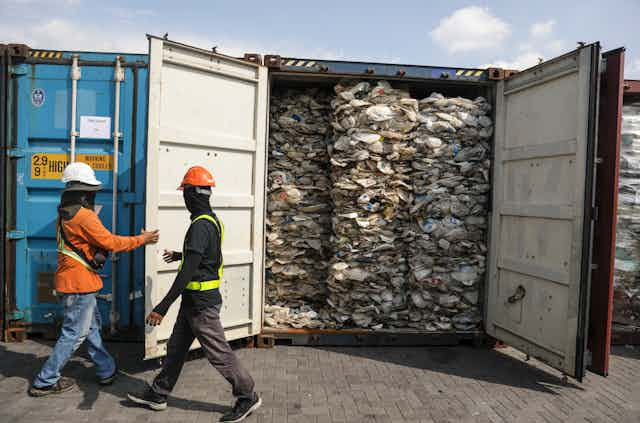The UK is the largest plastic waste producer in Europe and one of the biggest producers of plastic waste in the world, second only to the US. The UK produces 99kg of plastic waste per person per year. And it exports about two-thirds of this waste to poorer countries such as Malaysia, Pakistan and Vietnam.
Shipping unsorted plastic waste from the European Union to non-OECD countries was banned by the EU from January this year. But the UK continues to export plastic waste to developing countries as part of new post-Brexit regulations.
Most of the plastic waste is sold to these countries as the UK currently does not have the means and capacity to process it at home. But these countries also lack the infrastructure and capacity to recycle imported waste. And waste that can’t be recycled often ends up dumped in landfill or waterways or even burned – releasing toxic fumes into the environment. Indeed, much of the waste sent to these countries is unsorted and dirty plastics which can hardly be recycled anyway.
This trade of waste and the shifting of one country’s problem onto another simply cannot continue. Our behaviour as consumers is central to tackling this huge amount of plastic waste – along with the 26 million tonnes of general household waste produced yearly in the UK. We therefore all need to start taking responsible actions and be held accountable for the waste we generate. Of course, changing behaviour is not easy or straightforward.
Cultivating change
In its latest report, the Climate Change Committee, which advises the UK Government on the path to achieving net-zero carbon, emphasises that change in consumer behaviour is one of the major ways to speed up decarbonisation. But this is not something that can simply be forced on people. As my research shows, people need to support any changes and have a willingness to take up new habits aligned with the zero-waste economy.

The good news is that the COVID-19 crisis has already shown that people are open to changing their consumption habits. Many have started to buy locally, are more interested in buying clothes made out of recycled materials, and aim to consume less meat.
For things to really change, we need an all-embracing approach that engages everyone and intervenes early on in how products are designed and consumed to solve the waste crisis. But there are small things that each one of us can do to prevent and produce less waste. Many of these solutions are based on principles from the circular economy – a concept that promotes the elimination of waste and continual use of products and materials.
Here are some affordable and practical tips:
Use less - stop and reflect on your wasteful consumption practices and simply use less (as many have during lockdown). Rethink your lifestyle and only use what you need for your daily living; not everything may be essential.
Buy local - in the early stages of the pandemic, with flights grounded and entry in and out of countries proving problematic, food shortages were abundant. Buying local proved to be the alternative. Buying local is not only better for the environment but it also helps to support your local economy and local producers.
Be resourceful - try your best to reuse, repair or upcycle before you decide to throw away things you think no longer work. Be creative in how you might repurpose products and materials. It may simply be giving a new lease of life to your old furniture with a touch of non-toxic paint instead of getting new pieces.

Think beyond recycling – recycling is good, but we consume more than we recycle. So avoid buying goods that you cannot recycle. This will push businesses to better design products and ultimately, design out wasteful materials.
Rethink ownership - there is a rise in new businesses adopting “rental”, “pay per use” and “on-demand” models for products ranging from clothes to furniture. So where possible do not buy things you use only occasionally; instead pay for access to these things when you need them.
Above all, it’s important to remember that even very little change to our consumption habits takes us a step closer to reducing the UK’s 26 million tonnes of household waste. Achieve that and it will ultimately put us on track for a more sustainable post-pandemic world.

